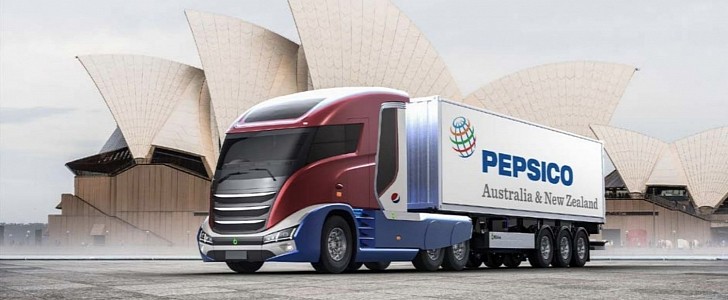PepsiCo is one of the biggest companies in the world. Its interest in semi-trucks that do not burn fossil fuels goes as far back as 2015. But things took a serious turn in 2017 when the food and beverage company was confirmed as one of the first customers of the Tesla Semi. Now, PepsiCo let everyone know that it will test a hydrogen-powered semi-truck through a partnership with an Australian company. Here’s what’s going on.
PepsiCo recently learned that Tesla will finally deliver the all-electric Semi that’s being touted as the next big thing for freight shipping. The first units will reach the company in December, and both parties anticipate a reduction in operational costs. Moreover, this would help PepsiCo with its green ambitions.
But going on the battery-electric route isn’t the only thing PepsiCo intends on doing for its global fleet of vehicles. Given that it is the largest food and beverage company in North America and the second-largest in the world, it must take the necessary steps to ensure that its global operations will continue to have a lowering impact on the environment.
PepsiCo signed an agreement with Pure Hydrogen to test a semi-truck that uses fuel-cell technology. The test is scheduled to take place in the second quarter of 2023, according to PV Magazine. The vehicle will be used at a PepsiCo manufacturing base in Brisbane.
Pure Hydrogen will provide PepsiCo with the zero-emission semi for AUD 10,500 (USD 6,710) per month, and in exchange, Pure will make sure hydrogen refueling, repair, and maintenance will all be done accordingly.
“This trial will further showcase the potential of Australia’s hydrogen energy markets – particularly for commercial trucking which currently relies heavily on the use of diesel fuel,” said PepsiCo’s Sustainability Manager for Australia and New Zealand.
If the trial will be successful, then PepsiCo might order fuel-cell semi-trucks in 2024 and 2025.
It’s not clear what semi-truck will be used for this trial. The only image supplied by Pure Hydrogen is a virtual rendering. However, what is known is that the Australian company will convert an existing semi-truck to run on fuel-cell technology. The power unit is expected to develop around 850 HP (862 PS).
Fuel-cell electric vehicles (FCEVs) do not need recharging as long as hydrogen is found in the pressurized tank. Hydrogen is combined with oxygen from the air in the fuel cell stack. After a chemical reaction, electricity is produced. This powers the motor, and the only emission is water.
Shipping goods is one of the transport activities that have a major contribution to air pollution. According to the Environmental Protection Agency (EPA), poor air quality leads to many health issues for humans, enhances global warming, and creates smog.
But going on the battery-electric route isn’t the only thing PepsiCo intends on doing for its global fleet of vehicles. Given that it is the largest food and beverage company in North America and the second-largest in the world, it must take the necessary steps to ensure that its global operations will continue to have a lowering impact on the environment.
PepsiCo signed an agreement with Pure Hydrogen to test a semi-truck that uses fuel-cell technology. The test is scheduled to take place in the second quarter of 2023, according to PV Magazine. The vehicle will be used at a PepsiCo manufacturing base in Brisbane.
Pure Hydrogen will provide PepsiCo with the zero-emission semi for AUD 10,500 (USD 6,710) per month, and in exchange, Pure will make sure hydrogen refueling, repair, and maintenance will all be done accordingly.
“This trial will further showcase the potential of Australia’s hydrogen energy markets – particularly for commercial trucking which currently relies heavily on the use of diesel fuel,” said PepsiCo’s Sustainability Manager for Australia and New Zealand.
If the trial will be successful, then PepsiCo might order fuel-cell semi-trucks in 2024 and 2025.
It’s not clear what semi-truck will be used for this trial. The only image supplied by Pure Hydrogen is a virtual rendering. However, what is known is that the Australian company will convert an existing semi-truck to run on fuel-cell technology. The power unit is expected to develop around 850 HP (862 PS).
Fuel-cell electric vehicles (FCEVs) do not need recharging as long as hydrogen is found in the pressurized tank. Hydrogen is combined with oxygen from the air in the fuel cell stack. After a chemical reaction, electricity is produced. This powers the motor, and the only emission is water.
Shipping goods is one of the transport activities that have a major contribution to air pollution. According to the Environmental Protection Agency (EPA), poor air quality leads to many health issues for humans, enhances global warming, and creates smog.








